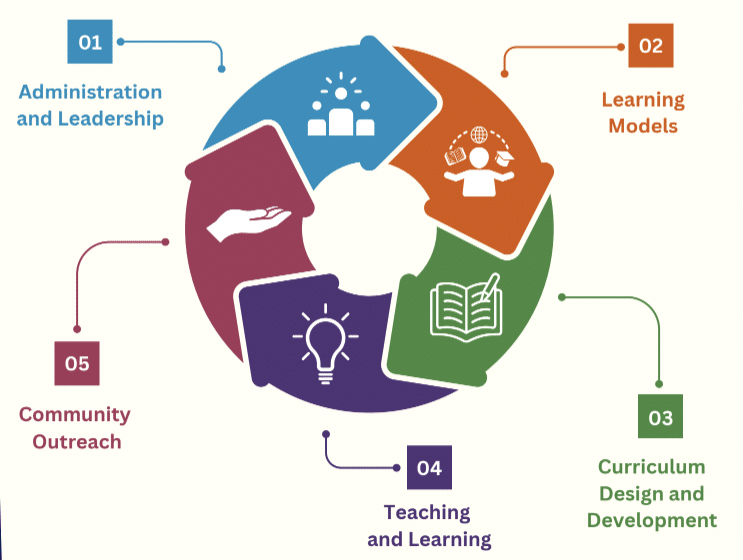Pennsylvania’s Journey Towards Student-Centered Learning: Building a Collaborative Statewide Movement
CompetencyWorks Blog
Introduction
How can we create learning environments that empower students to thrive, explore their passions, and reach their full potential? Pennsylvania is committing to dismantling systems that prevent evidence-based learning from being implemented in schools. Through a statewide movement that has been taking shape over the last two years, educators across the commonwealth are driving student-centered learning (SCL) forward across classrooms, districts, state agencies, and networks.
In Pennsylvania, SCL is defined as an approach that places students at the core of the learning process, emphasizing personalized instruction that meets individual needs, competencies, and interests. This method shifts the traditional focus from teacher-led instruction to one where students actively engage in setting learning goals, assessing progress, and taking ownership of their educational experience.
Rooted in the principles of competency-based education (CBE), SCL in Pennsylvania encourages a flexible learning pace, the use of real-world, project-based experiences, and critical thinking and collaboration, all aimed at preparing students for success beyond the classroom. This definition aligns with the Aurora Institute’s CBE framework, which Pennsylvania’s Department of Education has adapted in the process of conceptualizing a state-specific approach to SCL.
Phase 1: Laying the Groundwork
As in many states, there have been pockets of innovation happening that align with student-centered learning. This includes teachers and schools piloting SCL models and practices, as well as Pennsylvania’s educational service agencies (i.e., intermediate units) facilitating communities of practice related to personalized, student-centered, and online learning. In 2022, the state decided to nest these different, interrelated practices under the umbrella term of Pennsylvania Student-Centered Learning (PASCL).
The first phase of Pennsylvania’s SCL journey involved laying the groundwork for success. A dedicated SCL workgroup, the Student-Centered Advisory Council, was established by the Department of Education and tasked with developing a comprehensive SCL blueprint. Developed in collaboration with educators, administrators, and state leaders (including representatives from Penn State University and the PA School Study Council), this blueprint draws on Dr. Rebecca Heiser’s extensive research review. It provides clear strategies and core components for fostering student-centered environments.

The collaborative nature of this phase is particularly noteworthy, as input from various educational stakeholders ensured that the blueprint reflected diverse perspectives and addressed the unique needs of students across the state.
Their collaborative process, involving Pennsylvania’s Department of Education, culminated in a joint meeting in March 2023 with various stakeholders, including the Pennsylvania Association of Intermediate Units Curriculum Council (PAIUCC), PAIU Instructional Media Services (PAIMS), and the Learning Accelerator. This marked a pivotal step in promoting SCL statewide.
Phase 2: Expanding the Scope
With the foundation in place, the next step was to expand the scope of the PASCL initiative. Subgroups were formed to address specific aspects of student-centered learning, such as personalized learning models, technology integration, and fostering student agency. Each subgroup had distinct goals and focus areas, ensuring that different dimensions of SCL were thoughtfully explored and developed.
The work of these subgroups helped define actionable steps for educators to integrate SCL into their classrooms, ranging from project-based learning to inquiry-based approaches that empower students to take ownership of their learning.
Phase 3: Building a Statewide Network
As the work progressed, Pennsylvania moved to build a statewide network dedicated to advancing SCL. This network, which includes educators, policymakers, and community leaders, aims to share best practices and support SCL implementation across districts.
The structure of the network allows for continuous collaboration and the exchange of innovative ideas. Early outcomes include the spotlighting of SCL pilot programs and the development of support systems that provide ongoing professional development for teachers. The network has already shown its potential to support educators in enhancing student engagement and learning outcomes across the state.
Phase 4: Raising Awareness and Sharing Knowledge
To further amplify the PASCL movement and continue building momentum, PASCL leaders are organizing a Student-Centered Learning Summit at the Pennsylvania Educational Technology Expo and Conference (PETE&C) on February 10, 2025. This summit will bring together educators, researchers, and policymakers to share insights and strategies for implementing student-centered practices at scale.
The summit’s goals include showcasing successful SCL models, offering professional learning opportunities, and sparking new conversations on the future of education. This event is a critical component of Pennsylvania’s broader SCL initiative, as it will provide a platform for sharing knowledge and inspiring others to adopt these transformative practices.

Change Management and Implementation Challenges
Implementing SCL on a statewide scale is a multi-pronged, complex process. Pennsylvania has faced several challenges along the way, from securing buy-in from stakeholders to navigating logistical hurdles in integrating new educational technologies. In complex work like this, it is safe to assume that challenges will continue to crop up. With a continued focus on the “why” behind this work, its benefits for students, and a dedicated and diverse team, these future challenges will be addressed, just as past challenges have been.
By addressing these challenges, some key lessons have been identified, including the importance of clear communication, ongoing professional development, and flexibility in adapting to different school contexts.
Reflections and Next Steps
Pennsylvania’s journey toward student-centered learning has been marked by collaboration, innovation, and a steadfast commitment to reimagining education. As the state continues to expand its SCL initiatives, the potential impact on students and educators is profound. SCL offers a way to engage students in their own learning journey, ensuring they have the tools to succeed not only in school but in life.
However, Pennsylvania’s journey toward fully integrating SCL is far from over. The continued development of the statewide network and other projects of the PASCL movement will play a pivotal role in supporting SCL implementation at both the state and local levels. Long-term, the vision for SCL in Pennsylvania involves creating a sustainable model that fosters equity, engagement, and academic success for all students. Through these collaborative efforts, Pennsylvania aims to lead the way in innovative, student-centered education practices, collectively transforming education and unleashing the full potential of every learner.
We’re building a movement! Share your experiences with SCL, connect with the network, and help us shape the future of education in Pennsylvania.
Learn More
- Making a Portrait of a Graduate Authentic and Dynamic (Ephrata Area School District)
- Summing up the Competency-Based Education Journey (Building 21)
- Pairing Competency-Based Education with Project-Based Learning Makes for a Powerful Learning Experience

Dr. Josh Ecker is an experienced education leader and consultant specializing in personalized learning and innovative instructional models. With over a decade in K-12 education, Josh currently serves as the Learning Design Coordinator at Chester County Intermediate Unit, where he supports districts in integrating learner-centered strategies and emerging technologies. He has collaborated with educational leaders, including Johns Hopkins University, to enhance curriculum development and student outcomes. Josh’s work emphasizes the importance of strategic leadership in fostering engaging, student-centered learning environments. He hopes to inspire educators to embrace change and create dynamic, inclusive spaces where every student can thrive.

Kylie Hand is an educational leader with over 13 years in the K-12 sector, specializing in high-quality instruction, educational technology, personalized learning, and STEM innovation. She has served as a teacher, district administrator, and director at an educational service agency, leading initiatives in technology integration, professional development, and student-centered learning. As Director of Learning Design & Educational Technology at the Chester County Intermediate Unit, she played a key role in Pennsylvania’s student-centered learning efforts. Now based in Philadelphia, Kylie works as a Senior Education Consultant at Advanced Learning Partnerships Consulting, empowering schools to create transformative learning experiences that elevate potential and foster growth.